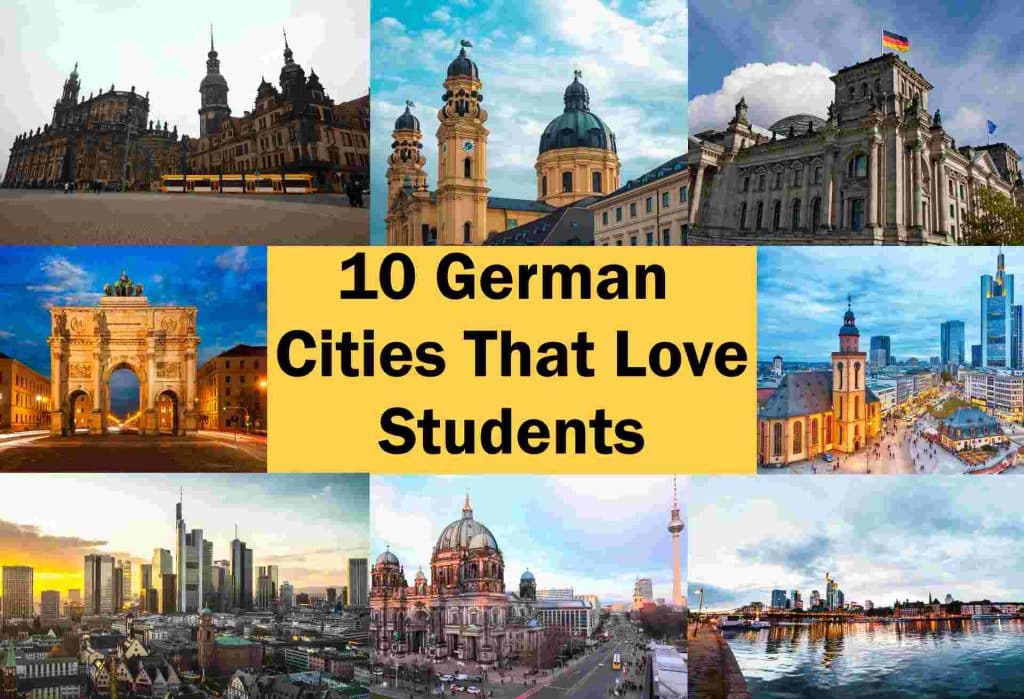
Ahhh, Germany! If you’d thought it’s only you who love Germany, you’re wrong, mate! ‘Coz Germany lo-awwwwwes you too! Yes, you heard that right. Now, let’s dive into the best German cities that love and adore international students.
Oh, wait! Ever wondered why you love Germany like you love Bruno (probably your pet)?
Here’s why:
- One big reason is the high-quality education system in Germany. This versatile country is known for its world-class universities and research opportunities. So, no matter your choice of bachelor’s, master’s, or PhD, you’re sure to find a program with loads of options.
- Germany offers affordable or even free tuition for international students at many public universities. This remarkable aspect helps you save on education costs and graduate with less debt.
- Germany’s invaluable culture attracts students who love to meet people from all over the world. This diverse trait makes Germany the perfect place to expand your horizons and develop a global perspective.
- The country boasts a strong economy and a flourishing job market. So, soon after graduation, you find it easy to secure internships and jobs, especially in fields like engineering and technology.
- Germany is known for being a safe and secure country. This means you get guaranteed peace of mind. And, the quality of life? It’s impeccable, with excellent healthcare, public transportation, and a robust social safety net.
- And as mentioned before, Germany has a rich cultural heritage. This means immersing yourself in rich art, music, food, and a vibrant social scene. Plus, its locale in the heart of Europe makes traveling to neighboring countries a breeze.
- And here comes the best part: Germany’s renowned beer culture and social scene. The relaxed atmosphere of beer gardens and the opportunity to taste different kinds of beer is beyond bliss. And if you’re an extrovert, this is THE PLACE to unwind and socialize with locals and fellow international students.
Best Big German Cities That Love International Students
Munich
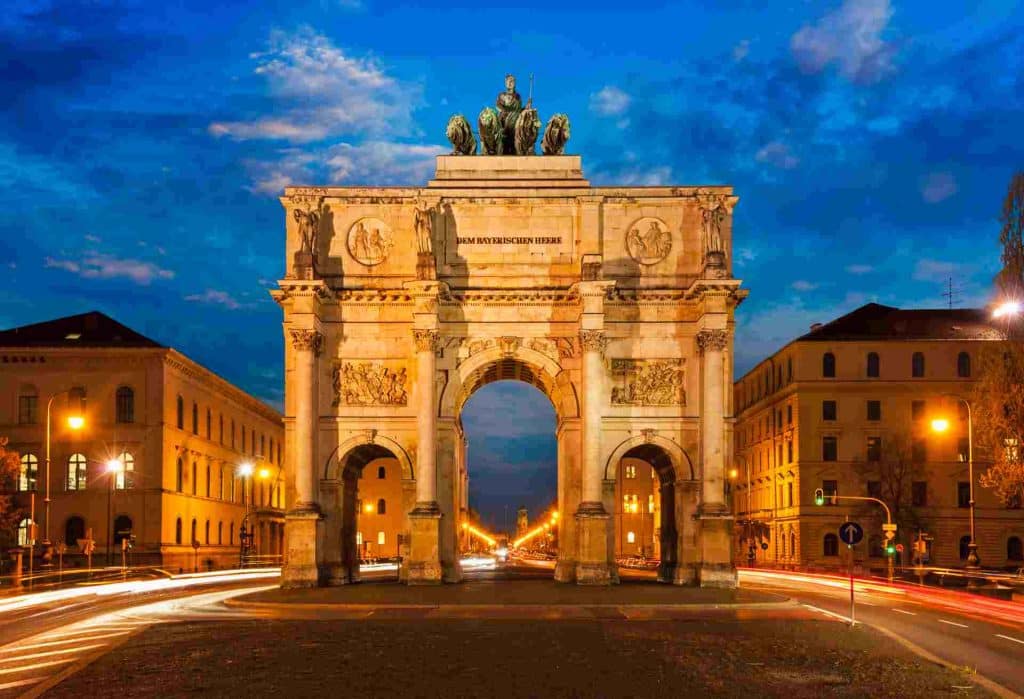
Quality of Life
Munich consistently receives top marks in international quality of life polls. With plenty of greenery and public parks like the Englischer Garten, one of the biggest urban parks in the world, it provides a hygienic and secure environment. The city’s excellent livability score is also a result of its effective public transit system and low crime rate.
Cultural Hub
Munich is widely recognized for its thriving cultural landscape, which includes an abundance of museums, art galleries, and historic buildings. World-class museums may be found in the city, including the Deutsches Museum, one of the biggest scientific and technology museums in the world, and galleries that display artwork from the medieval to the contemporary periods. Munich is also home to the well-known Oktoberfest, which draws millions of tourists each year.
Economic Power
Munich, the capital of Bavaria, is a significant commercial and economic center in Germany. It has a robust economy with a large concentration of Fortune 500 businesses, especially in the engineering, technology, and automotive industries. This is where Siemens and BMW have their headquarters.
Educational Institutions
It is a well-established fact that Munich is one of the best cities in the world to study abroad, and there are numerous compelling reasons to support this claim. First of all, it has world-renowned universities like Ludwig Maximilian University (LMU) and Technical University of Munich (TUM), consistently ranked among the best in the world. These universities offer various top-notch English-taught programs.
Munich’s flourishing job market offers students excellent career prospects, especially in fields like technology, engineering, and business. Many MNCs have a strong presence here, increasing opportunities for internships and part-time work.
Architecture and History
Munich’s skyline combines old and new, with prominent buildings like the Frauenkirche, the city’s cathedral, and the Neues Rathaus, Munich’s new town hall. The history of the city, which dates back to its establishment in the twelfth century and includes momentous occasions like the rise and collapse of Nazism, gives its cultural narrative additional depth.
Recreational Activities
Munich is a desirable destination for outdoor sports and activities, including skiing, hiking, sailing, and swimming, due to its close proximity to the Bavarian Alps and multiple lakes.
Berlin
Cultural Diversity
Berlin’s global atmosphere is characterized by a sizable immigrant community, which adds to the city’s varied artistic, culinary, and cultural offerings.
Historical Significance
The city’s pivotal role in both World War II and the Cold War is reflected in locations like the remains of the Berlin Wall, the magnificent Brandenburg Gate, and the historical museum at Checkpoint Charlie.
Art and Music Scene
Berlin is a major center for the arts worldwide and is renowned for its booming music scene, which includes being one of the birthplaces of techno. One of the top film festivals, Berlinale, is held in the city.
Political and Economic Center
Berlin, the nation’s capital and home to the Bundestag and several foreign embassies, is the center of German politics. It also has a thriving tech sector with a significant concentration of venture capital firms and startups.
Academic Prominence
The city is a hub for international students and academicians. It is the home to Humboldt University and the Technical University, offering various rich programs that fit the needs of the changing global market.
Further, Berlin’s public universities don’t charge local and international students fees. Instead, they recharge the students with their rich culture.
Cost of Living
Berlin’s cost of living is renowned for being very low when compared to other major European cities, drawing in young professionals, artists, and students. The city’s booming tech scene and entrepreneurial spirit open doors to internships and job opportunities. Finally, Berlin’s central European location makes it the ideal spot for exploring the continent.
Green Spaces
The city is full of green areas, with big parks like the Tiergarten and the now-public Tempelhof airport providing a wealth of chances for outdoor enjoyment.
Frankfurt
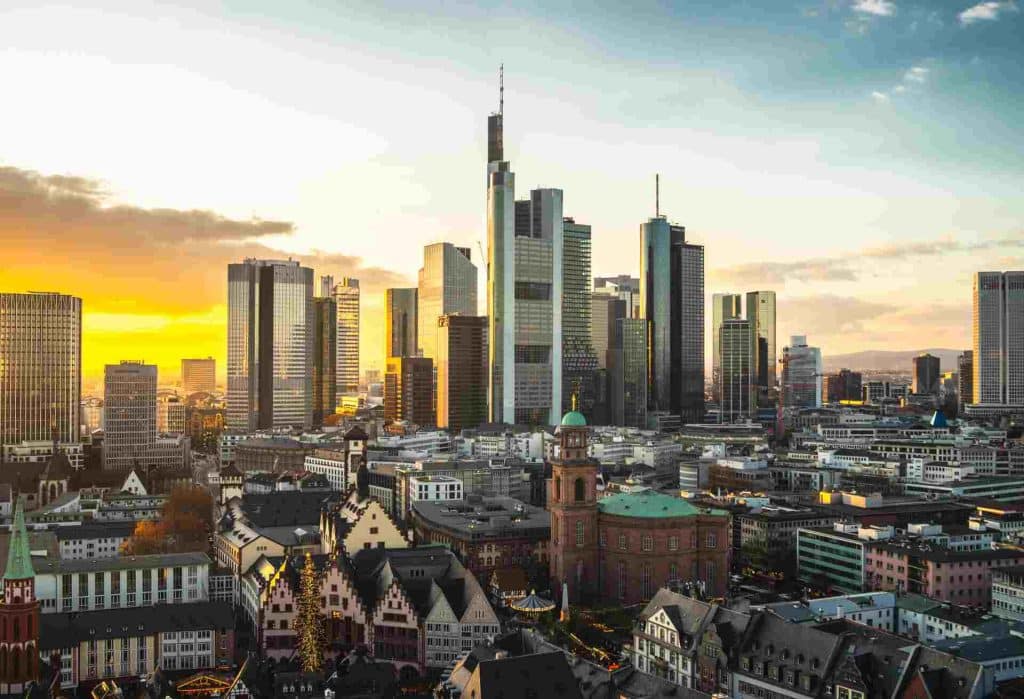
Financial Center
Frankfurt is regarded as one of the main financial centers in Europe and as the financial capital of Germany. In addition to the Frankfurt Stock Exchange, one of the biggest in the world in terms of market capitalization, it is home to the European Central Bank and the German Federal Bank.
Cultural Attraction
Frankfurt has a thriving cultural scene with museums like the Städel Museum, which has an impressive collection of artwork spanning from the Middle Ages to contemporary works, and the Frankfurt Opera, which is one of Germany’s top opera houses, despite its reputation as a business city.
Educational Institutions
The vibrant city is known for its excellent educational institutions, including the renowned Goethe University Frankfurt, which offers a variety of programs in English. The town also provides scholarships and support services for international students, helping them adapt to life in Deutschland.
Architectural Mix
Frankfurt’s unique skyline, which reflects its fusion of the modern and the historical, is made up of skyscrapers, which are uncommon in Germany, next to classic historical structures.
Quality of Life
With great healthcare, a thriving employment market, and lots of green space, including the city’s botanical garden, the Palmengarten, Frankfurt has a high ranking in the world’s quality of life indices.
Also Read: Top 10 Places to Visit in Frankfurt to Truly Understand the City
Hamburg
Standard of Living
Hamburg is renowned for its profusion of parks and gardens, including the well-known Planten un Blomen park, which features botanical gardens and huge water-light performances. The city’s many lakes and waterways, like as the Alster and Elbe rivers, offer a gorgeous environment that raises the standard of living in general.
Hamburg is regularly rated as one of Germany’s cleanest and safest cities for these two factors.
Education
Many universities, including the renowned University of Hamburg, are adored for their quality. So, whether you’re considering engineering, arts, or business, Hamburg has many reputable universities that provide top-notch education and ample opportunities for research and internships.
Work
Hamburg’s economy is healthy due to its status as a major port city and its presence in the media, aerospace, and logistics sectors. The city is home to several startups in addition to large corporations like Nivea and Airbus.
International trading: Hamburg is a major trading hub and home to a huge number of jobs in the shipping, trade, and logistics industries due to its status as one of Europe’s busiest and largest ports.
Tourism
Hamburg’s contemporary infrastructure and rich heritage entice visitors. Notable among these is the Speicherstadt, the world’s largest warehouse district, where the buildings are supported by timber pilings.
Hamburg has a wide range of cultural attractions, such as the world-famous Reeperbahn, a red-light and entertainment area, and the Elbphilharmonie concert venue, which is among the most acoustically sophisticated in the world. Hamburg’s maritime history adds to its allure, drawing tourists from all over the world to its annual Hafengeburtstag (harbor birthday festival) and harbor tours.
Aachen
Quality of Living
Nestled at the borders of Belgium and the Netherlands, Aachen is surrounded by the Eifel and Ardennes forests, providing residents with beautiful natural landscapes and ample outdoor recreational opportunities. Compared to larger student cities in Germany, this city ranks second in quality of life. Aachen is known for its friendly, community-oriented atmosphere and low crime rates, making it a safe and pleasant place to live.
Education
With a rich history, high quality of life, and affordability, Aachen is Germany’s second-best student city. Aachen is home to RWTH Aachen University and four other schools that offer 78 English-language programs in total.
Aachen certainly deserves its spot on this list of best cities in Germany for international students because of its affordable yet exciting student life. The city’s strong economy makes it easier for fresh graduates to obtain jobs in their desired fields.
Work
Aachen’s economy is strongly influenced by its academic institutions, with numerous technology companies and startups originating from university research. It also has a strong manufacturing sector, especially in machinery, automotive, and information technology. Due to its location near Belgium and the Netherlands, Aachen benefits from cross-border trade and collaboration, offering unique employment opportunities.
Tourism
Aachen’s history as the preferred residence of Charlemagne and the site of numerous imperial coronations is a major draw. The Aachen Cathedral, a UNESCO World Heritage site, is a major historical and architectural attraction. The city is famous for its annual CHIO (Concours Hippique International Officiel), one of the most prestigious equestrian events in the world. It also hosts several Christmas markets and medieval festivals that attract a large number of visitors.
Bonn
Quality of Living
The Rheinaue and the Botanical Gardens, two of Bonn’s most well-known parks and gardens, offer a tranquil haven inside the city. The city has a thriving theater, museum, and Beethovenfest celebration every year, which honors its renowned son Ludwig van Beethoven.
Education
Bonn is home to the University of Bonn, one of Germany’s largest, oldest, and most prestigious universities, offering humanities, natural sciences, and social sciences courses. The city is home to a large number of non-university research organizations that concentrate on a variety of scientific subjects. These organizations include those connected to the Max Planck Society and the Helmholtz Association.
Job opportunities
With 19 United Nations agencies and a large number of non-governmental organizations based there, Bonn has grown into a center for global cooperation. These institutions provide a wide range of career prospects in international relations and sustainable development. Bonn is still a major role in the telecommunications sector, having been the origin of Deutsche Telekom.
Historical Sites
The Poppelsdorf Palace and the Bonn Minster, two of Germany’s oldest churches, are examples of the city’s architecture and rich history. Music enthusiasts from all around the world visit the Beethoven-Haus, the birthplace of Ludwig van Beethoven. The Haus der Geschichte, a museum that sheds light on Germany’s history following World War II, is another attraction in Bonn.
Dresden
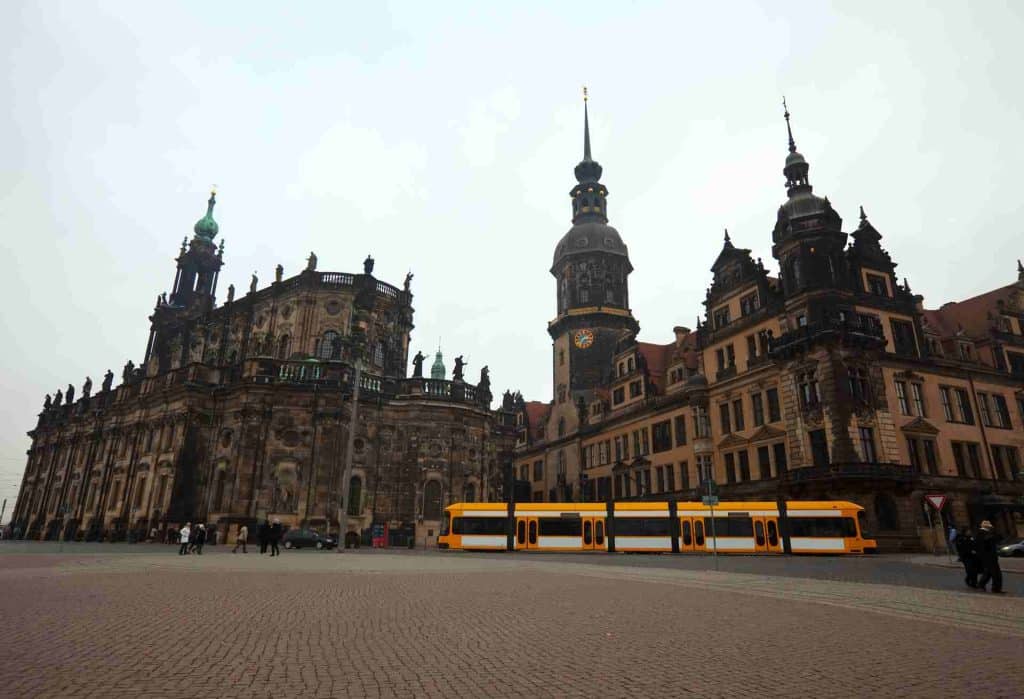
Quality of Living
Dresden’s breathtaking skyline, which features a multitude of rococo and baroque structures beside the Elbe River, is well-known. The city has regained much of its former beauty after undergoing substantial renovation after World War II, particularly in the historic center, which is home to the Frauenkirche, the Zwinger, and the Semperoper. Large green areas can be found all around the city. One such area is the Großer Garten, a sizable park designed in the baroque style that provides both locals and tourists with a peaceful haven from the bustle of the city.
What’s also great is that living costs in Dresden are pretty reasonable compared to other European cities. Tuition fees won’t break the bank. You’ll get to enjoy a high quality of life and a welcoming international community. And with its central location in Europe, you can easily explore nearby countries.
Academic Excellence
Dresden is known for its top-notch universities like TU Dresden and HTW Dresden, offering various programs and giving you plenty of options for your academic and career. The Technische Universität Dresden (TU Dresden), one of Germany’s biggest technical universities and a part of the TU9, an organization made up of the biggest and most prestigious German Institutes of Technology, is located in Dresden. The engineering, information technology, and applied sciences programs of TU Dresden are well-known.
The city is a hub for scientific research, aided by organizations such as the Leibniz Community and the Max Planck Institute. Dresden is also home to a significant biotechnology and microelectronics research presence, which is supported by cooperative networks between the university and other research centers.
Job Opportunities
Dresden has a strong industrial foundation, especially in the electronics and semiconductor industries. As a component of Silicon Saxony, the biggest microelectronics cluster in Europe, the city contributes significantly to the region’s employment and economic activities.
Tourism
Dresden’s extensive art collection and rich architectural history draw visitors. With multiple locations spread over the city, the Dresden State Art Collections (Staatliche Kunstsammlungen Dresden) is one of the most illustrious and established museum institutions globally. The city is well-known for its thriving cultural scene, which includes the Dresden Film Festival and the Dresden Music Festival, in addition to customary celebrations like Germany’s oldest Christmas market, the Striezelmarkt.
Stuttgart
Quality of Living
Stuttgart provides a well-balanced mix of extensive natural areas and urban living. Known for its lush green landscapes, Stuttgart is nicknamed “The Green U.” The city is also well-known for its wide parks and gardens, such as Rosensteinpark and Killesbergpark, which give residents access to nature amidst the urban setting, as well as its vineyards located inside the metropolitan area.
The city has a thriving music scene, state theaters, and the renowned Stuttgart Ballet, among other highlights of its rich cultural life. The bustling mood of the city is further enhanced by the numerous festivals held throughout the year, such as the Cannstatter Volksfest, which is the largest festival in Munich after Oktoberfest.
Education
Stuttgart is the home of the well-known University of Stuttgart, offering incredible technical programs. Stuttgart has a diverse student body consisting of people from around the globe, making the experience of discovering new cultures that much easier. The city is a center for scientific research, backed by organizations such as the Max Planck Institute for Solid State Research and the Fraunhofer Institutes, which work closely with regional businesses to develop ground-breaking ideas, especially in the fields of mechanical and automotive engineering.
Job Oppurtunities
Stuttgart is home to the corporate headquarters of significant companies like Porsche and Daimler AG (Mercedes-Benz), making it the birthplace of the automotive industry. The city’s economy is fueled by this industry, which also provides a wealth of excellent work prospects. Stuttgart’s strong economy is bolstered by high-tech industries such as IT, telecommunications, and electrical engineering, all of which provide a sizable number of jobs. This extends beyond the city’s automotive sector. As the “cradle of the automobile,” Stuttgart is home to Mercedes-Benz and Porsche headquarters and a fascinating Mercedes-Benz Museum that attracts more than 400,000 visitors annually.
Tourism
Historic sites like the elaborate New Palace (Neues Schloss) and the old castle (Altes Schloss), which is now home to historical museums, are popular tourist destinations in Stuttgart. Worldwide aficionados for automobiles are also drawn to the Mercedes-Benz and Porsche museums.
The city’s numerous festivals and events, like the aforementioned Cannstatter Volksfest and the Stuttgart Wine Village, bolster its vibrant cultural scene by offering a glimpse into regional customs and a sense of community.
Stuttgart is a particularly alluring city for both locals and tourists because of its innovative, cultural, and natural integration as well as its strategic significance in Germany’s industrial landscape.
Leipzig
Standard of Living
Leipzig is home to many parks and wooded areas, as well as a system of lakes and canals that provide a variety of leisure opportunities. Residents and visitors can enjoy outdoor recreational opportunities at Leipzig Neuseenland, a collection of lakes surrounding the city, and Clara-Zetkin-Park.
Education
One of the most eccentric things that makes Leipzig a favorite spot for international students is its vibrant arts scene. The city is a creative hub with countless theaters, galleries, and music venues. The famous Gewandhaus Orchestra and the Leipzig Opera are world-renowned.
Leipzig places a great focus on research and development, especially in the biotechnology and life sciences. The city is home to a number of non-university research facilities, including the Max Planck Institute for Human Cognitive and Brain Sciences.
Job Opportunities
Leipzig’s economy has experienced significant expansion in multiple domains, such as automobile manufacturing (owing to the presence of BMW and Porsche factories) and logistics, which can be attributed to the city’s advantageous location as a transportation hub. The Leipzig Trade Fair, a prominent international exhibition hub, has further stimulated growth in the IT, creative, and digital industries. The city has also established a notable startup culture.
Historical and Architectural Sites
Leipzig’s rich historical legacy, which can be observed in sites like the St. Nicholas Church, which was instrumental in the East German peace movement, and the St. Thomas Church, where Johann Sebastian Bach once worked, draws tourists. The city is home to the Gewandhaus Orchestra, which provides a top-notch classical music experience, and Leipzig Opera, which is among the oldest in Europe. Leipzig boasts an equally spectacular museum landscape, which includes the Leipzig Spinnerei, a museum of contemporary art, and the Museum of Fine Arts.
Besides history and culture, Leipzig also has an exceptionally infectious youthful energy. The city is bike-friendly, eco-conscious, and packed with trendy bars and clubs. And the cost of living? It’s reasonable, which is honey to a student’s ears. Leipzig is super welcoming to international students, where you’ll find a distinct community and many locals speaking English.
Cologne
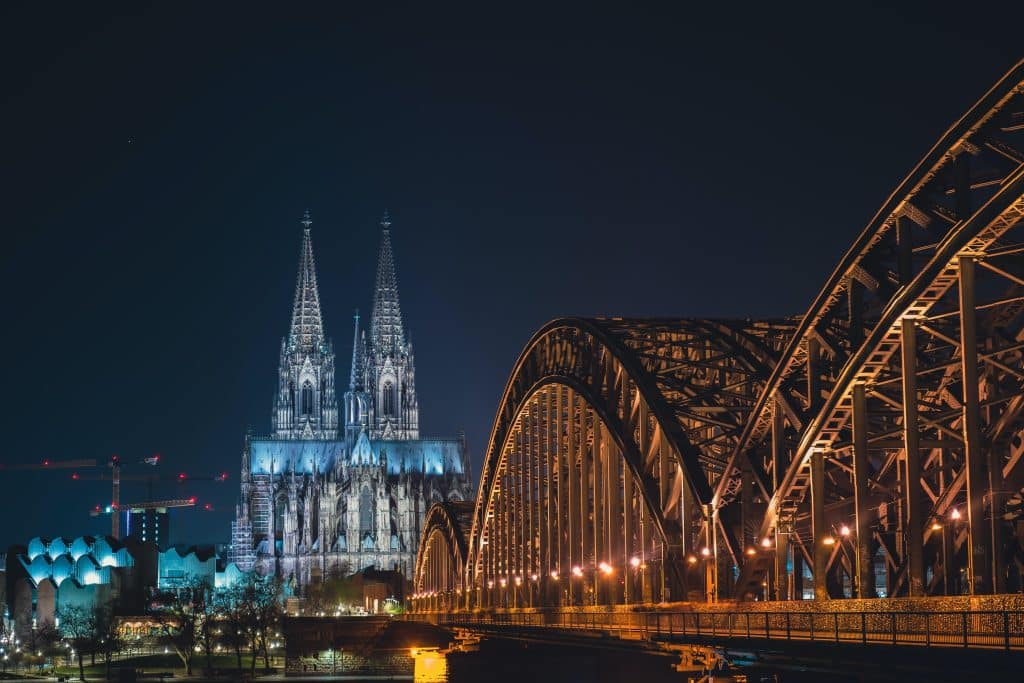
As the name says, this German city smells terrific! If you’re wondering if the city was named after the perfume, I’m sorry to disappoint you: the perfume was named after the city.
Quality of Living
Cologne offers a blend of urban living with a lot of green spaces, such as the Rheinpark and Stadtgarten, which give locals lovely areas to unwind and enjoy outdoor activities. The city has a strong infrastructure that offers first-rate public transit and contemporary facilities.
One of Europe’s biggest street festivals, the Cologne Carnival, is one of the city’s many annual cultural events. Cologne is renowned for its welcoming and cosmopolitan atmosphere.
Education
One of the biggest and oldest institutions in Europe, the University of Cologne is located in the city and is well-known for its business, arts, and scientific programs. The Cologne University of Applied Sciences also provides a variety of courses, especially in media studies and engineering. These universities offer distinct programs in various fields, so no matter your interest, you will likely find a suitable course.
Cologne’s standing as a center for scientific innovation and advancement is further enhanced by the presence of numerous research institutes, including the Max Planck Institute for the Biology of Ageing.
Job Opportunities
Cologne, the biggest city in the Rhine-Ruhr metropolitan area, boasts a thriving economy, bolstered by the media, insurance, and healthcare industries. It is the media center of Germany, housing the main offices of numerous broadcasters like RTL and WDR. The city has long been an important hub for trade due to its location on the Rhine River. It now enjoys the benefits of a sizable service industry and multiple trade shows hosted at the Koelnmesse, one of the biggest trade fair venues in the world.
Tourism
The Kölner Dom, or Cologne Cathedral, is the city’s most well-known landmark and a UNESCO World Heritage Site that draws millions of tourists there every year. The Old Town of the city attracts more visitors thanks to its picturesque streets and old structures. Cologne is home to a number of museums and cultural institutions, including the Roman-Germanic Museum, which showcases Cologne’s ancient Roman legacy, and the Museum Ludwig, which holds a sizable collection of modern art.
Because of these features, Cologne is a dynamic city that attracts both locals and tourists with its rich cultural and historical tapestry, strong employment market, and high standard of living.
Frequently Asked Questions
What are the 4 biggest cities in Germany?
The four biggest cities in Germany by population are Berlin, Hamburg, Munich, and Cologne.
Is Munich or Frankfurt bigger?
Though Frankfurt is the financial capital, Munich is bigger than Frankfurt in terms of population and city area.
What is the most luxurious city in Germany?
Munich
What are the 3 most expensive German cities?
Munich, Frankfurt, and Hamburg
Where is the nicest city in Germany?
Munich, Heidelberg, and Freiburg are regarded by many as some of the best cities in Germany. Thanks to their excellent quality of living, breathtaking scenery, and diverse cultural offers.
Which part of Germany is nice?
Southern Germany is mostly seen as pleasant because of its scenic regions, which include the Bavarian Alps, lovely lakes, and quaint cities like Munich and Freiburg. Rich cultural legacy and historically significant towns in this area are other well-known features.
What is the smallest city in Germany?
Arnis, in Schleswig-Holstein, is the smallest city in Germany. With only roughly 300 residents, Arnis is noteworthy for being the smallest town in terms of population, and land size measuring only 0.45 square kilometers.
Which city is the cheapest in Germany?
Germany’s cities have varying costs of living, although generally speaking, eastern cities are less expensive than western ones. Among them, Leipzig is frequently cited as one of the most reasonably priced major cities in Germany, providing an excellent quality of life at a relatively cheap cost of living that includes reasonably priced housing, food, and transportation. Two other eastern German cities that are frequently seen as affordable are Chemnitz and Halle (Saale).
Conclusion
There’s no doubt that Germany is a land of culture, beer, and precise engineering. But it doesn’t stop there. Germany is also an incredible hub for expats and international students. With its world-class universities, many of which offer tuition-free or affordable education, Germany has become a go-to destination for international students. The country’s welcoming atmosphere and top-notch living standards make Germany an ideal home away from home. Finally, the German education system is not only vibrant and welcoming to international students; it’s a place that prepares them for the future.




